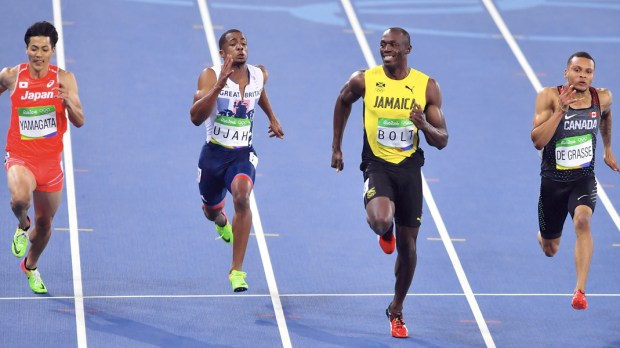Even the fastest man in the world has to stop and take a break.
Usain Bolt, the Jamaican runner who has racked up eight Olympic gold medals and 11 titles, on Saturday ran what he says will be his last individual race. Sadly, he did not go out in a blaze of glory.
Running at the London Athletics World Championships, Bolt won a bronze medal in the 100 meters. The gold went to Justin Gatlin, a 35-year-old American who has served two doping suspensions in his career. Gatlin finished in 9.92 seconds. American Christian Coleman, 21, took the silver in 9.94 seconds. Bolt’s 9.95 was his slowest time in a major 100-meter final.
“I’ve done all I can do for the sport and for myself,” Bold said later. “It’s time to go.”
Bolt, 30, has endeared himself to crowds with his antics, but there’s a more serious side to him as well. Though he grew up in a Seventh-day Adventist home, he has since become a Catholic. And as such, the Vatican in 2013 invited him to the TEDx Conference on Religious Freedom.
In a July 27 portrait of the runner in America magazine, Nick Ripatrazone described Bolt’s every move as he prepare to kick off from the starting block.
“He shifts onto his knees and looks toward the finish line,” Ripatrazone writes, calling Bolt the greatest Catholic athlete in the world. “Then, in front of the 35 million viewers who tuned into this race, Bolt makes the sign of the cross, closing his eyes as he swipes his hand across his chest. He raises a finger to his lips and then toward the sky, as he looks upward. His eyes linger there for a healthy moment.”
As he runs, a Miraculous Medal sways from his neck “like a metronomic pulse,” Ripatrazone continues. “He burns through the finish line and eases into a jog in front of the crowd. He gets down on a knee, lowers his head and crosses himself again before standing.”
Bolt took Leo as a middle name when he became a Catholic, reminiscent of one of three popes who have officially been designated “Great.” And Leo is the Latin for lion—and Bolt certainly has ruled track and field as the lion has been known as king of the jungle.
The America article suggests that the best way to understand Bolt’s identity is to “recognize the innate traits of sprinters”:
Bolt’s high school coach called him “hyperactive.” He was known as a practical joker. Unlike distance runners, who settle into a regular and meditative pace, sprinters must channel a firecracker-like power. The 100 meters is theater, and Bolt is its finest performer. In athletic time, the 100 meters is a heartbeat. Bolt crosses the finish line in well under 10 seconds. Sprints are electric events, over barely after they have begun. … Bolt’s pre-race metamorphosis is a tacit acknowledgment that he is about to enter another realm. The action of crossing himself, in some ways, is an invitation for the viewer to transcend the physical and enter that spiritual space where athletic greatness is possible.
Bolt has spoken about his laziness and his dislike of training, Ripatrazone pointed out. The writer sees those admissions of humanity as “small confessions of humility.”
The runner’s final, somewhat disappointing performance, therefore, can be seen in that light. Usain Leo Bolt is, after all, a man, not a god. He has stepped aside to let someone else bask in the limelight.
As Ripatrazone says, “He is at once one of us and nothing at all like us.”

